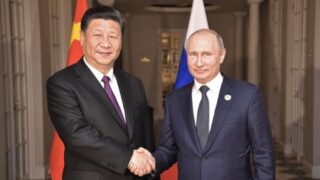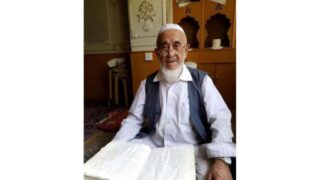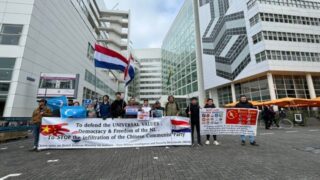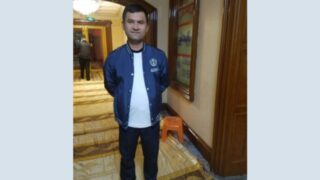Chinese high-tech equipment plays a significant part in the repression, which also targets those who protested against atrocities in Xinjiang.
by Laila Adilzhan


In Kazakhstan, authorities have recaptured the power, which they almost lost, through the Russian army. Russian troops, called by President Tokayev to protect himself from his own people, opened fire on peaceful civilians. Tokayev called peaceful protesters “terrorists.” He told Kazakhs that we have been “attacked by 20,000 terrorists.” Who were these terrorists and where did they come from was not explained.
Mass arrests and torture continue in Kazakhstan, as the authorities should find their 20,000 terrorists somewhere. Even bodies were taken out of their graves to check whether there are pictures capturing the deceased as participants in the protests.
What many international observers have overlooked is that all this is supported by surveillance technology supplied by China. All street cameras in Kazakhstan were made by the Chinese company Hikvision. President Tokayev personally visited this company and met with the owners. Huawei had received the “First Prize for Highest Trust” award from the first president of Kazakhstan, Nursultan Nazarbayev. And all state Internet routers are also made in China by Huawei. Both of these companies are under U.S. sanctions. In November 2021, President Biden signed the Secure Equipment Act of 2021, which prohibits such companies from obtaining licenses for network equipment in the United States.
Hikvision is the largest manufacturer of security cameras in the world. A peculiarity of the company is that it supplies cameras with face recognition to the state security in Xinjiang. And with the help of these cameras, the Chinese authorities operate a digital Gulag for Uyghurs, ethnic Kazakhs, and other Turkic populations of the region. It was Hikvision that created cameras with artificial intelligence able to automatically detect non-Han-Chinese citizens. The United States blacklisted Hikvision precisely because of its involvement in organizing the persecution in East Turkestan (Ch. Xinjiang).
Now, however, the number of Chinese-manufactured cameras in Almaty has reached the level of Xinjiang.
Bitter Winter has received confidential information that China has sent a special team to Kazakhstan to help with face recognition and identify the protesters. Kazakh citizens who did not commit any act of violence and only protested peacefully are being arrested based on facial recognition from surveillance cameras and AI-powered recognition technology, all made in China. The bodies of those killed in the protests are being dug out from the graves to check out whether the photos of the Chinese surveillance cameras correspond to the corpses. This would allow the authorities to justify the killings by claiming that the bodies are those of “terrorists.”
Chinese technology is also being used to access the phones of Kazakh citizens and ascertain through their chats whether they had participated in the protests. Huawei has a monopoly on almost all telecommunications in Kazakhstan. Huawei’s technical team is now helping Kazakh authorities arrest more innocent Kazakh youths. The Chinese company uses its technology to monitor the voice calls and text messages of all Kazakh citizens. And Huawei’s Internet switches are used to monitor all social media activity.
One victim of this system of surveillance was Kapar Akhat, a member of the original Atajurt human rights organization founded by my husband Serikzhan Bilash. Kapar lives in the capital of Kazakhstan, Nur-Sultan. He participated in the protest marches of January but maintained a peaceful attitude and certainly was not part of any violent or terrorist acts.
There was looting and destruction of property in Almaty—whose perpetrators have never been clearly identified, although many Kazakhs believe they were agent provocateurs and plainclothes intelligence officers—but not in Nur-Sultan. The protests in Nur-Sultan did not last for long, and the police simply told the protesters to go home, which they did.
Two police officers then went to Kapar Akhat’s home to arrest him on January 12. He perfectly understood that he was being arrested for his public criticism of the Chinese genocide in East Turkestan (Ch. Xinjiang) rather than for any alleged crime connected with the protests.
When the police went to Kapar’s home, he immediately started a Facebook live broadcast. Serikzhan Bilash saw the broadcast from the United States, called Kapar, and asked to speak with the police officers, who refused to disclose their names or to show a warrant for the arrest of Kapar (presumably, they didn’t have any). Later, the officers brought a piece of paper from the police station, filled it with Kapar’s name, and arrested him.
He was treated with courtesy and even offered tea, which is not typical of the Kazakh police. He was told that the authorities were afraid that his could become an international case. He was sent to the court in the middle of the night. His criminal charges, which could have resulted in a jail term of at least one year, were cancelled and converted to administrative charges, for which he was immediately sentenced to ten days of detention. Kapar Akhat was released from prison on January 22.
Serikzhan Bilash’s lawyer, Shynkuat Baizhanov, went to the police station in Almaty to provide legal assistance to two of his clients. He posted on his Facebook account on January 20 that, “Today I went to Detention Center number 18 in Almaty to meet with two young adults who were innocently accused in connection with the ‘Bloody January’ events. In the hallways of the Detention Center, young people with broken legs, crutches, injuries to the abdomen, shoulders, and head were waiting to meet with their lawyers. They (police) even brought one on a stretcher. Your stomach bleeds from the pain you see, you look into the eyes of your client, you bite your lips out of desperation, and on the outside, you say, ‘Be patient, do not despair, everything will be fine.’ I have two clients there, two young adults. ‘We are urinating blood, they told me, they (the police) have done unthinkable things to us, torturing, and making us sign papers to admit our guilt, but in fact we have done nothing other than going to a peaceful meeting.’ ‘They cannot establish your guilt without actually proving it, I said, and illegally documents signed under duress are not valid.’ I will try my best to prove their innocence, but unfortunately…”









